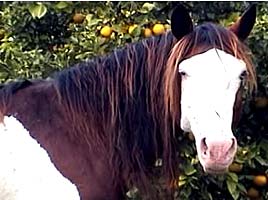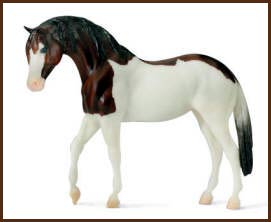 |
 |
|
Preserving the Rare Beauty of the Abaco Barb
Written by Tamra - ebreyerhorses
For over 500 years, a mysterious herd of beautiful wild horses has roamed the pine forests and sandy beaches of Abaco in the Bahamas. Only in 2002, after a decade of research, were they
finally identified and designated by the Horse of the America's Registry as the Abaco Barb,
descendents of horses brought over at the time of Columbus’s explorations - a new strain of the endangered Spanish Barb and perhaps the purest strain in existence anywhere. The struggling
remnants of a once mighty herd of 200 are facing extinction for the second time in their recently turbulent history.
“This is one of the top events of the ten years I’ve been working to save these horses,” says
Milanne Rehor, President and Field Director of Arkwild, Inc., a not for profit U.S. corporation that works to save small endangered populations of animals. “The phenotype of these horses
(characteristics that make them Barbs) has been recorded on videos and stills . We developed a tissue sampling dart so we could have three different sets of DNA analysis done without having to
tranquilize the horses to draw blood. UCLA, University of Kentucky, IMD in Germany and Horse of the Americas Registry all came to the same conclusion: “Spanish. ” (Horse of the
Americas Registry registers only horses of irrefutable Columbian era Spanish descent.). In addition, many of the horses show a rare color pattern, splash white. Geneticists have suggested
that a gene for this rare pattern may be developing. The lineage of the Abaco Barb goes back to the horses of the Barbary Coast of North Africa. In Spain the horses were developed into the
Spanish Barb. Throughout the world the Barb is recognized as critically endangered. Abaco and the Bahamas are curators of possibly the purest strain remaining in existence. “
There are at least 13 Columbus era Spanish ships on the reef strewn coast of the islands lying just offshore Great Abaco, and Spanish ships of the Conquest always carried horses so their
presence on the island makes sense. It would have been an easy swim across to the ‘mainland’
island where forage and water were abundant in the pine forest of Great Abaco. The forest was
an equine paradise. Unfortunately, it didn’t last. In the 1960’s a road opened up the forest to
boar hunters who shot the horses when their dogs chased the horses instead of boar. A tragedy involving a young child who kicked a gentle, captive wild horse when she climbed up on it, was
killed when the horse mistook the signal and bolted, dragging the child to her death. Retribution was swift and cruel.
 In the 1960’s the herd was reduced to three horses.
Several Abaconians intervened and brought the three horses to a farm near Treasure Cay. A herd of 35 built up again, yet since 92 over half the horses have died. These losses were almost all
entirely preventable. The stallions fight, without medical care sometimes the wounds are fatal. Mares have died giving birth; foals are killed by packs of dogs, and in one case, by a human.
Having lost the knowledge of the forest as home, the horses stay closer and closer to the center of the
farm where they eat too much food raised with pesticides, herbicides and chemical fertilizers, resulting in obesity. Not enough movement results in extremely bad hooves. There have been no
foals since 1998, though there was one abortion (stallion rape) and one fetus aborted for unknown reasons. In the 1960’s the herd was reduced to three horses.
Several Abaconians intervened and brought the three horses to a farm near Treasure Cay. A herd of 35 built up again, yet since 92 over half the horses have died. These losses were almost all
entirely preventable. The stallions fight, without medical care sometimes the wounds are fatal. Mares have died giving birth; foals are killed by packs of dogs, and in one case, by a human.
Having lost the knowledge of the forest as home, the horses stay closer and closer to the center of the
farm where they eat too much food raised with pesticides, herbicides and chemical fertilizers, resulting in obesity. Not enough movement results in extremely bad hooves. There have been no
foals since 1998, though there was one abortion (stallion rape) and one fetus aborted for unknown reasons.
There came a drastic point where just 12 horses remained by mid-2004. These are the last 12 horses left world wide! When asking Mimi if she had any future plans of offering the Abaco Barb
horse to others around the world, she answered back "No, we have no plans to let the horses off the island. They've been through enough and the world of commercial horse dealing is not
something which I want to be involved."
Throughout the world, Barbs are recognized as critically endangered. The Abaco Barbs nearly
went extinct in the early 1970's. Today they are once again fighting for survival. The horses have
been returned to a preserve in their ancestral forest home. Their history, as we know it today, follows.
Today, the young stallion Capella stands strong and proud among the tough survivors in this once
-mighty herd. Full of life and spirit, he bears the beautiful white splashes, bright coat, and flowing
mane that are characteristic of the breed. His tough, compact body and strong legs underscore the Abaco Barb's stamina and endurance - two traits that will be crucial for the herd to rebuild
and the breed to survive.
Milanne Rehor, head of Arkwild, Inc. and Project Director for WHOA (Wild Horses of Abaco
Preservation Society), has worked since 1992 to save the herd and to publicize its plight. Hearing the call, the Salmon Model Horse 4-H Club in Idaho began campaigning Breyer for an Abaco
Barb model to help raise awareness. Breyer is pleased to join their worthy efforts with the introduction of Capella, and will contribute a portion of all Capella sales to the fund.
In 1992 Rehor spent three months in the Abacos and brought to public attention the fact that the horses, nearly exterminated in the 60's, were making a slow comeback.
In 1992 there were about 30 horses living in the pine forests on Great Abaco Island, Bahamas. Overcoming a harsh environment and warding off continued wild dog attacks which destroy
several foals a year, the herd appeared to be no longer in danger of extinction. A second trip in 1994 confirmed these findings and suggested continued research.
A third research trip was done (Dec. 1996 to July 1997). Grim statistics resulted: the herd was down to 20 horses. By the time Rehor got back in January, 1998, the herd was down to 17. As
of fall 2004, the last remaining horses of the Abaco Barb herd is down to 19; l0 mares, 9 stallions.
 Arkwild’s overall goals are to provide these rare
and beautiful horses with a safe and secure future, whatever their origins, by educating the public about the inappropriate human intervention that has
prevented them from once again reaching viable numbers. For information about Arkwild and WHOA, visit www.arkwild.org. Arkwild’s overall goals are to provide these rare
and beautiful horses with a safe and secure future, whatever their origins, by educating the public about the inappropriate human intervention that has
prevented them from once again reaching viable numbers. For information about Arkwild and WHOA, visit www.arkwild.org.
Contact: Our Friendly Office
41190 Road G
Mancos, Colorado 81328
Phone: 970-533-7772
Email: service@e-breyerhorses.com
Website: www.e-breyerhorses.com/ |
 |
|
To advertise your horse product or service, contact Ann
|
 |
|
InfoHorse.com, Horse Information Lives Here ® 12/27/2025
Contact Us to Advertise to over a million Horse Owners.
All images and content Copyright© 2012 by InfoHorse.com, Equusite.com.
Horse Owners are Dog Owners; Dog Product Information dognowner.com
|
|
|
Articles, Academic Schools, Arena Maintenance, Animal Communicators, Barns, Barn and Accessories, Barn Equipment and Tractors, Breast Collars, Grooming Products for Horses, Hay Feeders, Horse Blankets, Horse Books, Horse Videos, Horse Breeders, Horse Camping Gear, Career Schools, Carts and Buggies, Horse Training Clinicians, Equestrian Clothing, Dogs and Puppies, Horse Fencing, Western Art & Furniture, Horse Property for Sale, Horse Products For Sale, Fly Control, Foal Care, Horse Footings, Horse Gifts, Horse Health and Nutrition, Hoof and Leg, Horse Insurance, John Lyons Certified Trainers, Equine Lawyers, Leather Care, Links, Horse Property, Horse Photography, Portable Horse Stalls, Arenas and Roundpens, Horse Riding Schools, Horse Schools, Safety Products, Services for Horses, Horse Trailers, Horse Shipping, Horse Skin Coat Care, Horse Software, Specialty Trainers, Horse Summer Camps, Tack, Horse Trainers, Treats and Snacks, Truck Accessories, Trucks, Horse Vacations, Western Lifestyle, jewelry
|
|
|
|